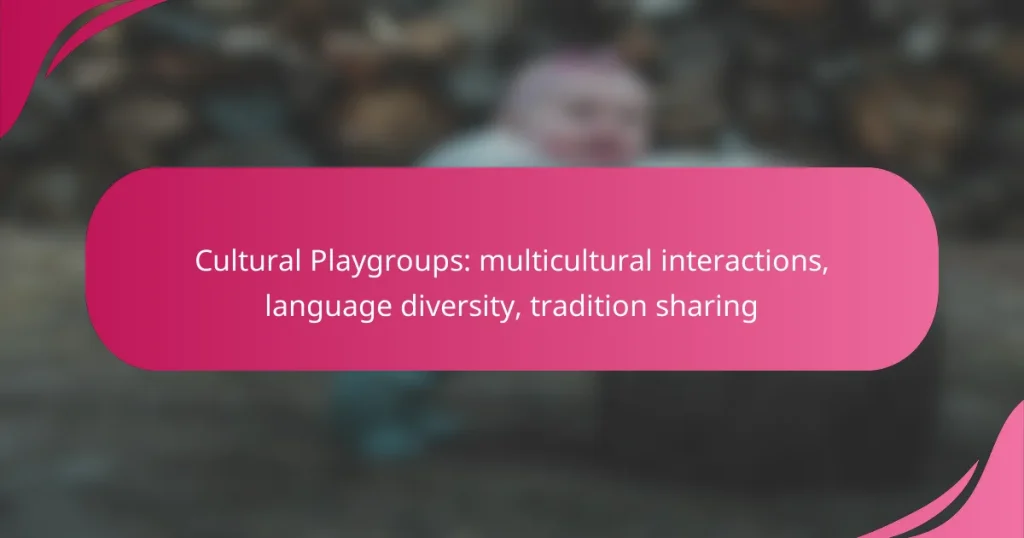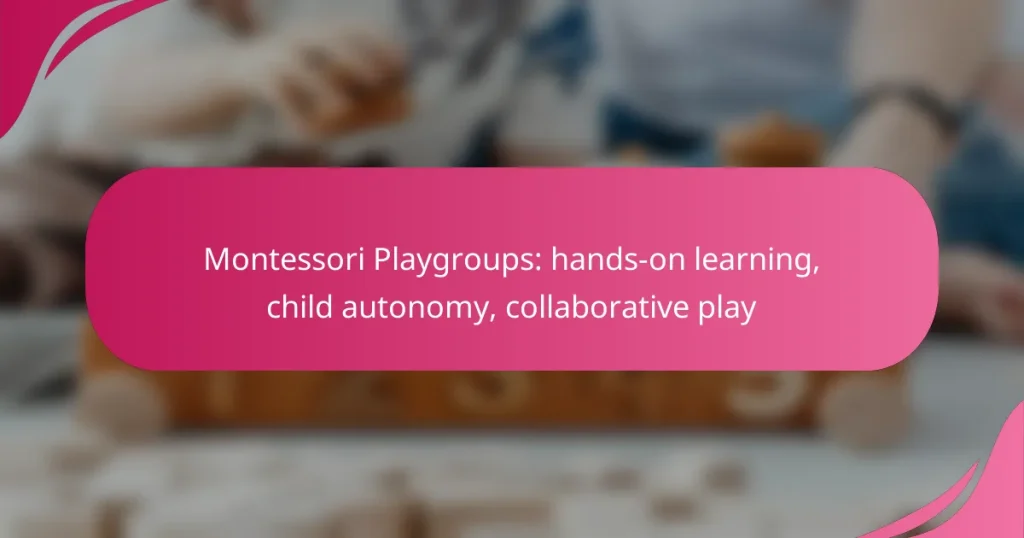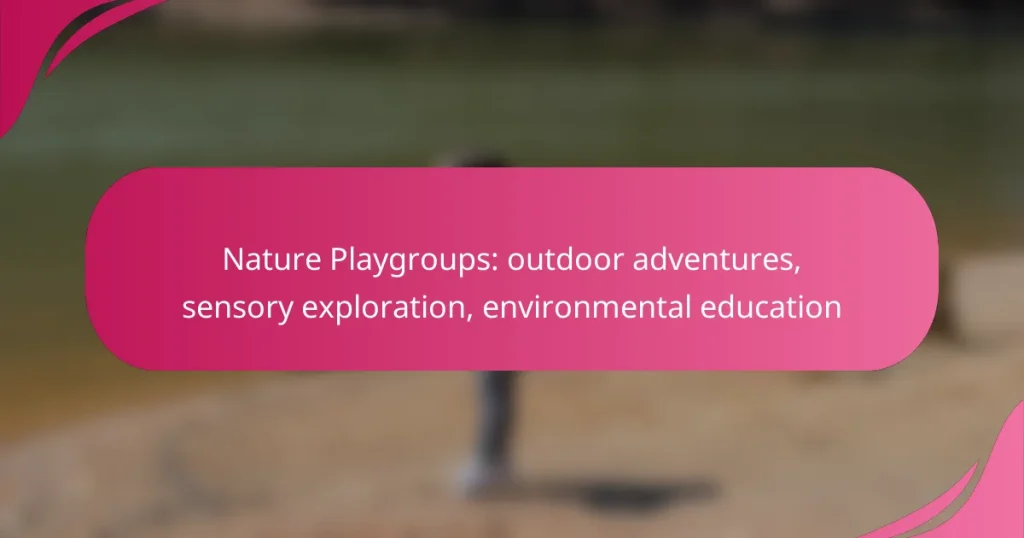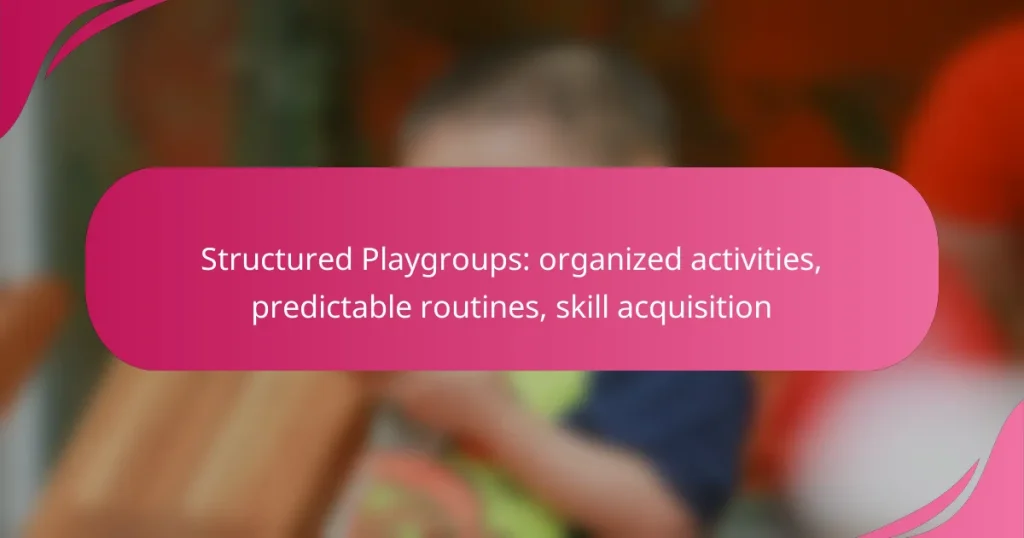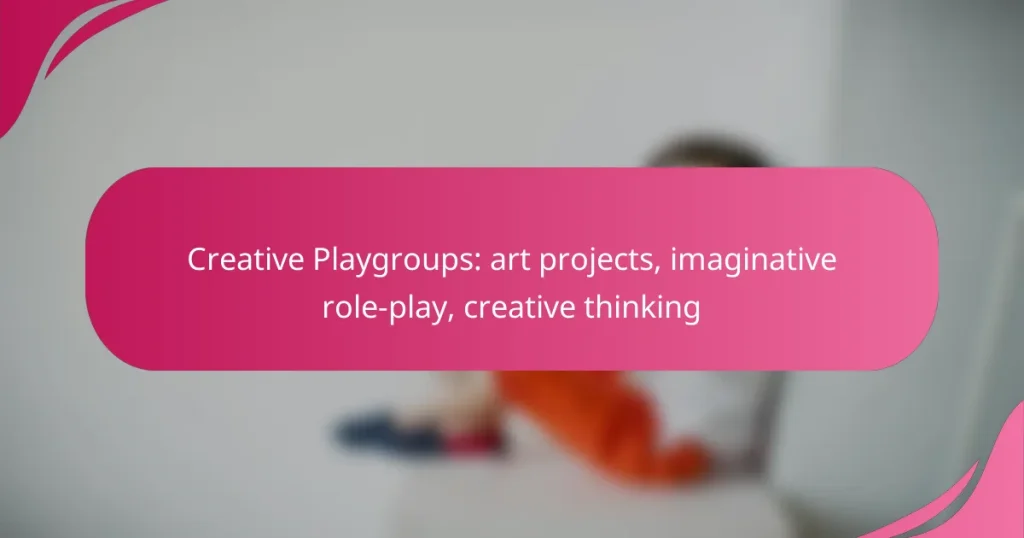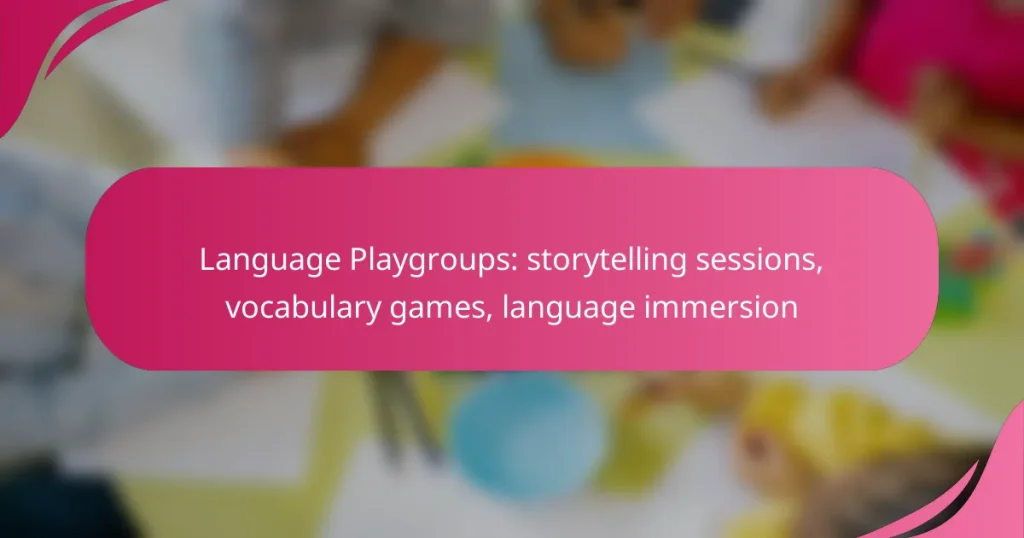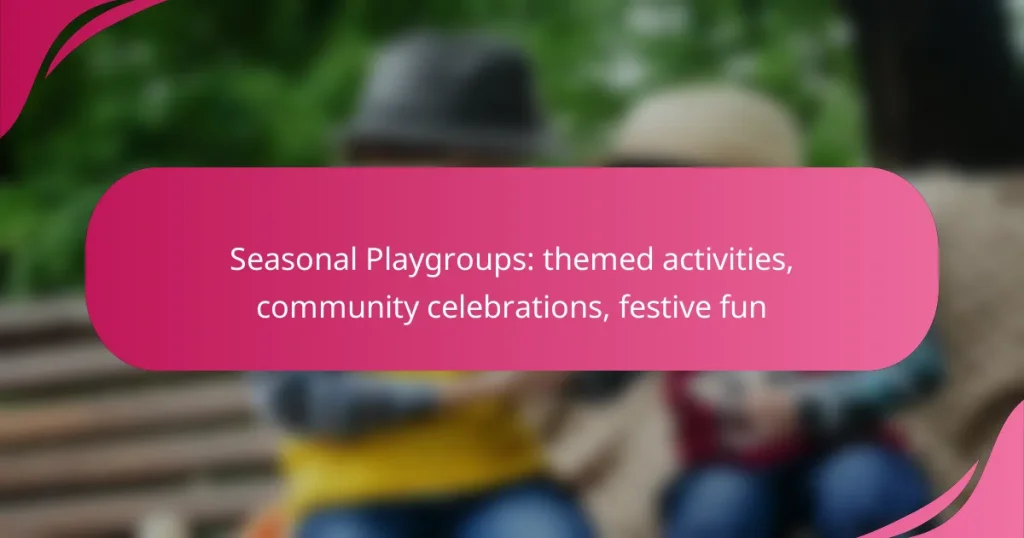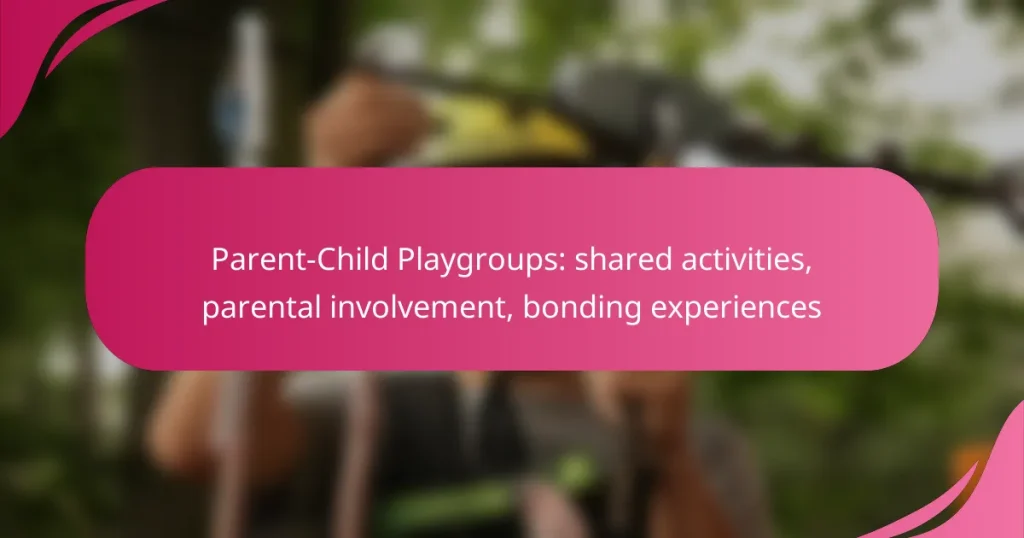Exploring different playgroup types reveals diverse approaches to early childhood development. Montessori playgroups focus on self-directed learning, encouraging children to explore and discover at their own pace, while cooperative playgroups foster community and collaboration among families, enhancing social skills through shared activities. Each type offers unique benefits that cater to varying needs and preferences in a child’s formative years.
Montessori Playgroups: hands-on learning, child autonomy, collaborative play
Nature Playgroups: outdoor adventures, sensory exploration, environmental education
Structured Playgroups: organized activities, predictable routines, skill acquisition
Pop-Up Playgroups: temporary setups, community events, flexible participation
Creative Playgroups: art projects, imaginative role-play, creative thinking
Language Playgroups: storytelling sessions, vocabulary games, language immersion
Virtual Playgroups: online engagement, digital tools, remote connections
Seasonal Playgroups: themed activities, community celebrations, festive fun
Parent-Child Playgroups: shared activities, parental involvement, bonding experiences
What are the experiences in Montessori playgroups?
Montessori playgroups provide a unique learning environment where children engage in self-directed activities. These settings emphasize exploration and discovery, allowing children to learn at their own pace while fostering independence and social skills.
Child-led learning
In Montessori playgroups, child-led learning is a fundamental principle. Children choose their activities based on their interests, which promotes intrinsic motivation and engagement. This approach allows them to explore subjects deeply and develop a love for learning.
For example, a child interested in nature might spend time examining plants or insects, while another might focus on building with blocks. This freedom encourages creativity and critical thinking.
Individualized attention
Individualized attention is a hallmark of Montessori education. In these playgroups, teachers observe and guide each child based on their unique needs and developmental stages. This tailored approach helps children progress at their own pace.
Typically, the teacher-to-child ratio is lower than in traditional settings, allowing for more meaningful interactions. This ensures that each child receives the support they need to thrive.
Hands-on activities
Hands-on activities are central to the Montessori experience. Children engage with materials that are designed to be tactile and interactive, which enhances their learning. These activities often involve real-world tasks that help children make connections between concepts and their environment.
For instance, children might use counting beads to learn math or participate in practical life skills like pouring or sorting. Such activities not only teach academic concepts but also foster fine motor skills.
Mixed-age interactions
Mixed-age interactions are a distinctive feature of Montessori playgroups. Children of varying ages learn together, which promotes peer learning and social development. Older children often mentor younger ones, reinforcing their own knowledge while helping others.
This dynamic creates a community atmosphere where collaboration and respect are emphasized. It allows children to learn from one another, enhancing their social skills and emotional intelligence.
Focus on independence
A strong focus on independence is evident in Montessori playgroups. Children are encouraged to make choices, solve problems, and take responsibility for their actions. This emphasis on self-sufficiency helps build confidence and resilience.
For example, children are taught to care for their environment, such as cleaning up after activities or organizing materials. This responsibility fosters a sense of ownership and pride in their learning space.
How do Waldorf playgroups differ from others?
Waldorf playgroups focus on holistic development through artistic and imaginative play, distinguishing them from more traditional educational settings. They emphasize nurturing creativity, fostering a connection to nature, and integrating seasonal celebrations into the learning experience.
Emphasis on creativity
Waldorf playgroups prioritize creativity as a core component of early childhood development. Activities often include arts and crafts, music, and movement, allowing children to express themselves freely. This approach encourages imaginative thinking and problem-solving skills, which are essential for lifelong learning.
Seasonal festivals
Seasonal festivals play a significant role in Waldorf playgroups, celebrating the rhythms of nature and the changing seasons. Events such as harvest festivals and winter solstice celebrations create a sense of community and connection to the environment. These gatherings often involve storytelling, music, and crafts, reinforcing cultural traditions and seasonal awareness.
Storytelling and imagination
Storytelling is a fundamental aspect of Waldorf education, fostering imagination and language development. Teachers often use puppetry and oral storytelling to engage children, allowing them to visualize and connect with narratives. This method not only enhances listening skills but also encourages children to create their own stories, further developing their creative abilities.
Nature-based learning
Nature-based learning is integral to the Waldorf approach, with outdoor play and exploration being highly valued. Children spend ample time in natural settings, which promotes curiosity and respect for the environment. Activities may include gardening, nature walks, and seasonal observations, helping children develop a strong connection to the world around them.
What benefits do cooperative playgroups offer?
Cooperative playgroups provide a collaborative environment where parents and children can engage in shared activities, fostering community ties and enhancing social skills. These groups emphasize mutual support and resource sharing, creating a vibrant network for families.
Community involvement
Cooperative playgroups encourage active participation from families, leading to stronger community ties. Parents often organize events, outings, and activities that not only benefit their children but also enhance relationships among families in the area.
For example, local parks or community centers may host playgroup gatherings, allowing parents to connect while their children play. This involvement can lead to lasting friendships and a supportive network for families.
Shared resources
Sharing resources is a key advantage of cooperative playgroups, as families can pool their skills, toys, and educational materials. This reduces individual costs and allows for a wider variety of activities and learning experiences for children.
For instance, one family might provide art supplies, while another offers books or outdoor games. This collaborative approach ensures that children have access to diverse play experiences without the burden of high expenses.
Parent participation
Active parent participation is a hallmark of cooperative playgroups, where adults engage in activities alongside their children. This involvement not only enhances the play experience but also allows parents to model social behaviors and problem-solving skills.
Parents can take turns leading activities, ensuring that everyone contributes and feels valued. This shared responsibility fosters a sense of ownership and commitment to the group’s success.
Social skill development
Cooperative playgroups are instrumental in developing children’s social skills through interactive play and group activities. Children learn to share, take turns, and communicate effectively with peers, which are essential skills for their future interactions.
Regular participation in these groups can lead to improved confidence and emotional intelligence as children navigate social dynamics in a supportive environment. Parents can reinforce these skills at home by discussing playgroup experiences and encouraging similar behaviors.
What are the key features of traditional playgroups?
Traditional playgroups are characterized by their structured environment, guided by educators to foster early childhood development. These groups typically emphasize routine, teacher-led activities, and a focus on foundational skills through a standardized curriculum.
Structured routines
Structured routines in traditional playgroups provide children with a predictable schedule that helps them feel secure and understand expectations. Activities often follow a consistent pattern, such as circle time, free play, and snack breaks, allowing children to transition smoothly between tasks.
For example, a typical day might start with a welcome song, followed by story time, and then move into guided play. This predictability can enhance children’s ability to focus and engage in learning activities.
Teacher-led activities
In traditional playgroups, teacher-led activities are central to the learning process. Educators facilitate structured lessons that introduce concepts through play, songs, and interactive storytelling. This approach allows teachers to guide children’s learning and provide immediate feedback.
Activities may include group games, arts and crafts, or simple science experiments, all designed to encourage participation and collaboration among peers. These interactions help develop social skills and foster a sense of community within the group.
Focus on basic skills
Traditional playgroups prioritize the development of basic skills such as language, motor skills, and social interactions. Educators design activities that promote these foundational abilities, ensuring that children are prepared for future educational settings.
For instance, activities like singing songs enhance vocabulary, while puzzles and building blocks improve fine motor skills. This focus on essential skills lays the groundwork for more complex learning in later years.
Standardized curriculum
A standardized curriculum in traditional playgroups ensures that all children receive a consistent educational experience. This curriculum typically aligns with national early childhood education standards, providing a framework for what children should learn at each developmental stage.
Parents can expect that their children will engage in a variety of subjects, including literacy, numeracy, and social studies, all tailored to their age group. This uniformity helps parents assess their child’s progress and readiness for school.
How do outdoor playgroups enhance child development?
Outdoor playgroups significantly enhance child development by providing a dynamic environment that encourages exploration and physical activity. These settings promote social interactions, creativity, and cognitive skills through unstructured play and natural challenges.
Physical activity
Outdoor playgroups facilitate physical activity by allowing children to engage in various movement-based games and activities. This exposure helps develop motor skills, coordination, and overall fitness, which are crucial for healthy growth.
Activities like climbing, running, and jumping not only strengthen muscles but also improve cardiovascular health. For instance, children can participate in obstacle courses or group games that require running and teamwork, making exercise enjoyable and engaging.
To maximize the benefits of physical activity in outdoor playgroups, ensure that children have access to a variety of play equipment and open spaces. Regularly scheduled outdoor sessions can help maintain high levels of engagement and physical fitness.
